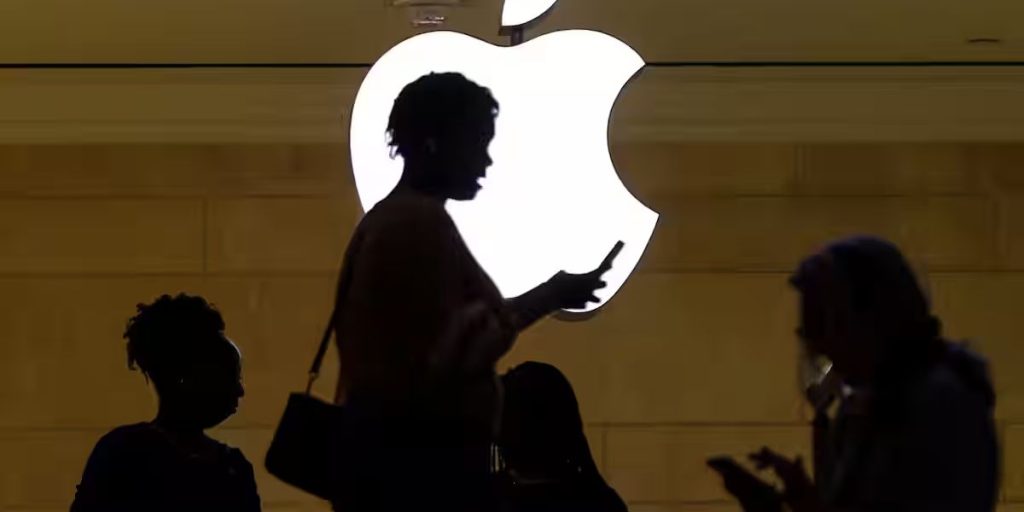The US Justice Department’s two-pronged antitrust campaign on Google’s dominant search and Apple’s trendsetting iPhone is evoking memories of the epic war that hamstrung Microsoft before it surged back to become the world’s most valuable corporation.
The parallels to the Justice Department’s landmark antitrust lawsuit in 1998 may provide a glimpse into the potential breakthroughs that could result if authorities succeed in their efforts to crack down on Google and Apple.
Federal prosecutors have even claimed that Google and Apple would never have built so many popular goods or become as dominant as they are today if Microsoft had not been restrained a quarter century ago.

In the final arguments of a Washington, D.C., trial that began in September, regulators will put the finishing touches on a case alleging that Google has transformed its search engine into an illegal monopoly that stifles competition and innovation. The Apple action, which was only filed a month ago, is still years from being resolved.
Although regulators have filed separate charges against Google and Apple, the two cases are overshadowed by Microsoft’s legal drama, which began when both companies were just specks on the digital landscape.
When regulators went after Google in October 2020, they contrasted the lucrative deals the business made with Apple to lock its search engine onto the iPhone and Safari web browser to the strategies Microsoft used in its personal computer software to prevent competition.
And in the antitrust cases that they brought against Apple last month, the Justice Department linked back to objections that firm co-founder Steve Jobs had voiced in 1998 against Microsoft’s “dirty tactics” while encouraging regulators to take action to force the PC software maker “to play fair.”
And that’s what the Justice Department did in an antitrust case against Microsoft, causing major distractions and paving the way for Google’s search engine to become the internet’s primary gateway. It also resulted in a series of concessions that allowed Apple to expand the reach of its iTunes music shop, increasing the popularity of the iPod, which birthed the iPhone.
The Microsoft case “created new opportunities for innovation in areas that would become critical to the success of Apple’s consumer devices and the company itself,” according to the Justice Department’s lawsuit, which accuses Apple of monopolizing the iPhone.
After years of generally unsuccessful attempts to compete with Google’s search engine and the iPhone under Steve Ballmer’s leadership, Microsoft began to find its footing when Satya Nadella became CEO in 2014.
Earlier this year, Microsoft’s market value surpassed Apple’s as the world’s most valuable firm, while also taking the lead in artificial intelligence technology that is predicted to transform the world.
It’s an odd dichotomy that has authorities opposing two firms they helped create when they trapped a colossus, now vying for the mantle in technology’s next frontier.
However, antitrust experts point to this tableau as proof that the system is working to foster more strong competition, which leads to innovation. And then those achievements can serve as the foundation for new monopolies that must eventually be challenged by regulators, while fallen empires like Microsoft can still remake themselves.

“It’s not about pursuing and destroying companies; it’s about restoring market competition,” said Rebecca Haw Allensworth, a law professor at Vanderbilt University who specializes in antitrust law. “What happened in the Microsoft case is a success story that can also serve as a pattern for Apple and Google when people wonder why America is attempting to destroy its most successful corporations. Microsoft has done exceptionally well following a big antitrust claim against it.”
The Justice Department’s historic case against Microsoft was not the first time an antitrust lawsuit served as a springboard for other corporations to emerge as dominating forces that must be dealt with as well.
For example, separate antitrust actions filed against IBM in 1969 and AT&T in 1974 paved the door for Microsoft and Apple to launch the personal computer revolution, which was followed by the internet boom and the smartphone explosion.
These are the types of innovations that have fueled economic growth and society-changing products that would not have occurred if antitrust regulators had remained silent while IBM and AT&T exploited their respective monopolies, according to Yale University economics professor Fiona Scott Morton.
“When you innovate successfully, you can grow like crazy, but then it’s 20 years later, and it’s hard to keep growing like you were,” said Scott Morton, former chief economist in the Justice Department’s antitrust section. “So, instead of relying solely on innovation, you realize, ‘Hey, we have a lot of market power, we could use that to raise profits.'”
“It’s only natural that this happens on a regular basis, and regulators must say, ‘No, that part isn’t allowed; you have to compete on merits.'” And when you succeed in forcing more competition, someone else usually wins the next race.
After the concluding arguments in the Justice Department’s antitrust case against Google conclude this week, U.S. District Judge Amit Mehta is anticipated to make his decision in late summer or early fall. Meanwhile, the case against Apple will proceed in New Jersey federal court, as antitrust regulators investigate whether Microsoft is once again crossing the line to acquire an unfair edge in the still-developing field of artificial intelligence.